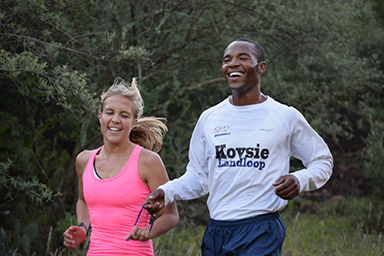Latest News Archive
Please select Category, Year, and then Month to display items
12 October 2020
|
Story Arina Engelbrecht
|
Photo Supplied
 Arina Engelbrecht from Organisational Development and Employee Well-being believes physical activity has a number of benefits for one’s health, including stress relief.
Arina Engelbrecht from Organisational Development and Employee Well-being believes physical activity has a number of benefits for one’s health, including stress relief.
Being physically active plays a big role in preventing the development of mental-health problems and in improving the quality of life of people experiencing mental-health problems.
Treatment for depression
Physical activity can be an alternative treatment for depression. It can be used as a stand-alone treatment or in combination with medication and/or psychological therapy. It promotes all kinds of changes in the brain, including neural growth, reduced inflammation, and new activity patterns are formed that promote feelings of calm and well-being. It releases endorphins – powerful chemicals in the brain that energise your spirit and make you feel good.
Physical activity can be very effective in relieving stress. Research in adults has found that physically active individuals tend to have lower stress levels compared to individuals who are less active. It also leads to improved sleep. When a person sleeps better and feels more rested, overall quality of life improves. They cope better with daily life stressors.
Reduce Alzheimer's risk
Regular physical activity can reduce your risk of developing Alzheimer's disease by up to 50%. It can also slow down further deterioration in those who have already started to develop cognitive problems. It stimulates the brain’s ability to maintain old connections as well as to make new ones.
A study asked people to rate their mood immediately after periods of physical activity (e.g. going for a walk/run, cycling, doing housework) and periods of inactivity (e.g. reading a book or watching television). Researchers found that participants felt more content, more awake, and calmer after being physically active compared to after periods of inactivity.
In conclusion, people who are physically active feel a sense of well-being, feel more energetic throughout the day, sleep better at night, have sharper memories, and feel more relaxed and positive about themselves and their lives.
“Being physically active not only changes your body, it changes your mind,
attitude, and your mood.” – Arina Engelbrecht
Louzanne Coetzee heading for Paralympic Games in Rio
2016-08-02

Louzanne Coetzee (left) from the University of the
Free State and her guide Khothatso Mokone, a former Kovsie,
will compete in the Paralympic Games in Rio de Janeiro,
Brazil, from 7 to 18 September 2016.
Photo: Rufus Botha
Her perseverance and faith. Faith in herself and her coaches, as well as her Christian faith. Rufus Botha says this is what makes the Paralympic athlete Louzanne Coetzee special. According to her coach, the 23-year-old star from the University of the Free State (UFS) is easy to work with. “Her work ethic is incredible. As coach, I actually have to stop her,” he jokes. “She does not like to rest.”
On 19 July 2016, Coetzee was included in South Africa’s Paralympic team for the Olympics in Rio de Janeiro, Brazil. She and her guide Khothatso Mokone, also a former Kovsie, were included in the team that will participate in Rio from 7 to 18 September 2016.
Sights still set on 2020 Olympics
In Brazil, Coetzee will compete in the T11 category in the 1 500 m. The blind athlete is also outstanding in the 800 m and 5 000 m, of which she is the world record holder, but these items do not feature at the Olympics.
Botha says Coetzee has her sights still set on the 2020 Paralympic Games in Tokyo, Japan. “Anything she achieves in Rio will actually be a bonus.” He says it was an achievement on its own to be included in the SA team among established athletes such as Arnu Fourie and Ilse (Hayes) Carstens.
CUADS super proud of record-breaker
“Anything she achieves in Rio
will actually be a bonus.”
“Louzanne is an absolute star and an example to so many Kovsie students,” says Martie Miranda, Head of the Centre for Universal Access and Disability Support (CUADS) at the UFS. “We are super proud of her.”
On 17 July 2016, Coetzee set a new Africa record (5:00:25) in the 1 500 m in Berlin. She will leave for Rio on 30 August 2016, with her heat taking place on 15 September 2016 and the finals on 17 September 2016.